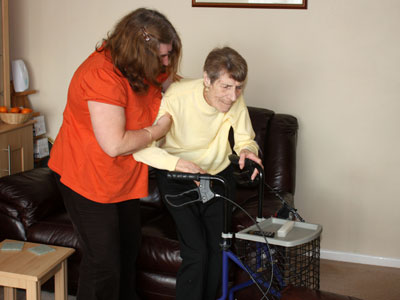
Most home care visits commissioned by councils are 30 minutes or less putting service users’ dignity at risk and depressing pay for domiciliary care workers, a survey of providers has found.
Almost three-quarters (73%) of home care visits in England appeared to last 30 minutes or less, found the survey by the United Kingdom Homecare Association, though the figure was lower in Scotland and Wales at 42%. One-third of providers across the UK said the short visits they were asked to provide were putting clients’ dignity at risk.
The UKHCA, which polled 739 providers across the UK, 655 from England, said rises in council eligibility criteria meant providers were now dealing with clients with much greater needs who would often require longer visits because of the amount of support they needed to accomplish daily tasks.
The association also raised concerns about providers’ ability to retain staff and even meet the national minimum wage because of the combination of downward pressure on fees, a lack of funding for staff travel time and providers being paid by the minute, in terms of care delivered, rather than through pre-arranged blocks of time.
Nine in ten providers said they had received a real-terms decrease in fees from councils in 2011-12, while just 28% said they were paid an enhanced rate for visits of less than an hour in order to cover workers’ travel time. In addition, 40% of providers in England and 27% in Scotland reported that they were being paid by the minute, because of the use of electronic monitoring systems.
‘Home care treated as a commodity’
“As a care provider, you are often left wondering whether council commissioners give any consideration at all to the consequences for people’s dignity and safety of the decisions they take on short visit times,” said Mike Padgham, chair of the UKCHA. “Too often councils treat commissioning of home care services as a commodity – bought primarily on price – like paper clips. Councils cutting costs and commissioning shorter visit times is hitting caseworkers hard too.”
The Association of Directors of Adult Social Services said the findings reflected overall levels of under-funding for care but did not give a full picture of the situation. It said that the length of each visit needed to be seen in the context of many people receiving more than one home care visit a day as well as support through other services.
It also said that the survey’s estimate of the average hourly price paid by councils in England for care – £12.84 – did not seem unreasonable even allowing for travel time and overheads in the context of a minimum wage of £6.19 an hour. Also, with over half of community service users in England on personal budgets, visit times were often agreed with clients themselves.
Adass president Sarah Pickup also hit back at Padgham’s claim that commissioners were treating homecare services like paper clips. “To suggest that people work in social care departments in order to treat people no better than paper-clips is too offensive to be worthy of a reply,” she said.
Pickup also repeated her calls for providers to cease bidding for contracts where they did not believe they could deliver good care at the price.
Related articles


 ‘Dear Sajid Javid: please end the inappropriate detention of autistic people and those with learning disabilities’
‘Dear Sajid Javid: please end the inappropriate detention of autistic people and those with learning disabilities’ Ofsted calls for power to scrutinise children’s home groups
Ofsted calls for power to scrutinise children’s home groups Seven in eight commissioners paying below ‘minimum rate for home care’
Seven in eight commissioners paying below ‘minimum rate for home care’ Children and young people with SEND are ‘valued and prioritised’ in Wiltshire, find inspectors
Children and young people with SEND are ‘valued and prioritised’ in Wiltshire, find inspectors 
 Facebook
Facebook X
X LinkedIn
LinkedIn Instagram
Instagram
Comments are closed.